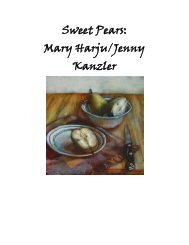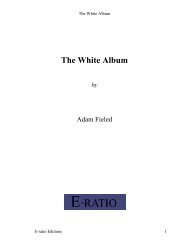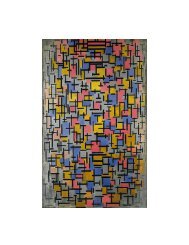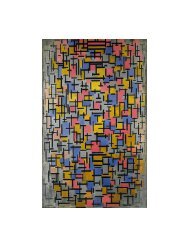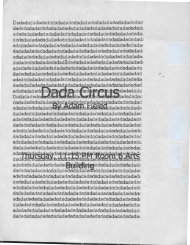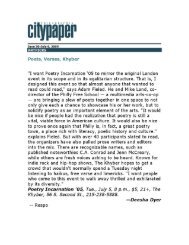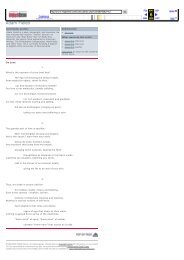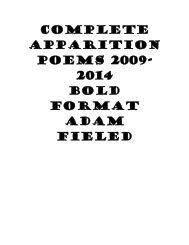Posit-Deposit
This pdf consolidates the 2007 Adam Fieled Dusie chap "Posit" with its 2013 sequel, "Deposit."
This pdf consolidates the 2007 Adam Fieled Dusie chap "Posit" with its 2013 sequel, "Deposit."
Create successful ePaper yourself
Turn your PDF publications into a flip-book with our unique Google optimized e-Paper software.
Adam Fieled<br />
<strong>Posit</strong>/<strong>Deposit</strong>
“<strong>Posit</strong>” Preface<br />
“<strong>Posit</strong>,” released as a Dusie chap in June 2007, was my first print publication.<br />
Most of the “<strong>Posit</strong>” poems had been written in the winter months which joined 2006 and<br />
2007. It was my first year as a University Fellow at Temple University in Philadelphia,<br />
and a Fellowship year— I didn‟t have to teach. In the fall of 2006, I had done a graduate<br />
workshop with Rachel Blau DuPlessis. She called her own work “post-Objectivist”— a<br />
continuation of the investigative interrogation of textual subjectivity by poets like George<br />
Oppen and Carl Rakosi (who called themselves Objectivists), with a slant towards<br />
feminism and a bias towards Deconstructionist literary theory. Rachel was heavily critical<br />
of any first person sensibility, expressed in poetic language, which didn‟t take the time to<br />
investigate and interrogate its own efficacy. The belief that language could only be<br />
justified “qua language,” rather than language opening a transparent window on whatever<br />
a naïve subject desires you (as reader) to see (this thought-circuit is a lift from Derrida)<br />
was one Rachel carried through all her writing and reading tasks. I was thirty, and just<br />
beginning to publish seriously— I couldn‟t help but be influenced.<br />
The mood I caught, while composing the “<strong>Posit</strong>” poems that winter, was a<br />
congeries of this influence with other contingent factors— my first trip to Chicago in<br />
December ‟06 (memorialized in “Illinois Sky”), the spookiness of West Philadelphia and<br />
the Eris Temple (“Le Chat Noir”), and even the perceived contemporary relevance of<br />
Greek myth (“Eyeballs”). I separated myself from Rachel‟s formulations by maintaining<br />
a narrative voice— without a narrative voice, what animates poetry to begin with?<br />
Rachel‟s own work suffered heavily from lack of a strong narrative voice— even more<br />
from the notion that narrative itself was (and even could be) outdated and outmoded.<br />
Rachel, for some reason, associated narrative with the nineteenth century— but the truer<br />
association is more thoroughgoing, i.e. poetic language is impossible (utterly so) without<br />
narrative, for words following words to create narrative is what creates the effect of<br />
symbol and art, always. Poetry sans narrative struck me as a gimmick, and still does.<br />
Rachel and her compeers did betray a weakness for gimmick, which compromised their<br />
self-praised idealism.<br />
In any case, “<strong>Posit</strong>” did not disavow narrative cohesion, nor did it fall prey to<br />
gimmick-mongering. The cohesion of the chapbook as a gestalt is loosely themed around<br />
not only an interrogation but a celebration of the poetic “I,” not relying on the<br />
disjunctures and ellipses which were trendy in 2007, but on sensual objective correlatives<br />
(“Illinois Sky,” “Le Chat Noir,” Eyeballs,” “Dracula‟s Bride”) and formal experiments<br />
which combined disjunctures with straightforward narrative (“<strong>Posit</strong>,” “Come to the<br />
Point,” “Day Song”). The theoretical gist of “<strong>Posit</strong>” is this— mixing the tenets of<br />
Deconstructionism with poetic language is richest and most rewarding if, amidst the<br />
ellipses and disjunctures, poetic language is allowed to be itself— to carry, not only<br />
narrative and voice, but sensuality, imagery, simile/metaphor, and intimations of<br />
profound emotion. If all the constituent elements which form the backbone of poetic<br />
language are lost, what‟s left is a mere husk— and American avant-garde poetry, for the<br />
second half of century XX and into century XXI, is largely a congeries of husks, hollow<br />
spaces and impoverished waste lands. “<strong>Posit</strong>” is meant to represent the initiation of a<br />
new, rich strain of American poetry— and its influence has been felt. AF, 2013
<strong>Posit</strong><br />
I want<br />
but that‟s<br />
nothing new.<br />
I posit<br />
no boundary<br />
between us.<br />
I say you,<br />
I know you,<br />
I think so.<br />
I know<br />
what world<br />
is worldly.<br />
I know<br />
how death<br />
stays alive.<br />
I never<br />
enter third<br />
person places.<br />
I could<br />
go on<br />
forever.
I am that I<br />
that stations metaphor<br />
on a boat to<br />
be carried across.<br />
that makes little<br />
songs on banisters,<br />
which are slipped down.<br />
that slips down<br />
antique devices,<br />
china cutlery & white.<br />
I am coming to<br />
the point. I am<br />
come to the point.<br />
I am that I.<br />
Come to the Point
Day Song<br />
& this reflexivity, right now: how it bounds.<br />
how we are the sum total of our limitations.<br />
we catch glimpses. what‟s in the catching.<br />
what‟s beyond, behind, between: purple fear.<br />
bodies randomly chosen, for different reasons.<br />
dreams of form. charades. too bad, but<br />
always the knowledge, if we are lucky, of<br />
scattered constellations in the world. chewable.<br />
fragments. progress. only in patches. must. do.
One could sink upwards into<br />
it, lose brown earthy stains.<br />
Conglomerated air-pockets,<br />
tucked into figments, wide<br />
enough to lend temporality<br />
sense, day‟s square progress.<br />
This I don‟t know about, this<br />
feeling, expanse contracted,<br />
sex impulse etherealized, I<br />
can‟t see this w former eyes.<br />
It is, after all, a doorstep,<br />
just me entering me again—<br />
cream purse, vulval sheen.<br />
Illinois Sky
I was skulking in<br />
a dorm room with<br />
Lars Palm, who<br />
was chucking<br />
lobsters. A yellow<br />
globule tried to<br />
get our goat; a wall<br />
started talking.<br />
Lars was furious.<br />
Some girls were<br />
involved with us,<br />
as junk piled up.<br />
Lars threw a<br />
lobster at the<br />
yellow globule,<br />
roaring. It was<br />
a pivotal moment—<br />
bare walls. Rubbish<br />
heap. Fucked<br />
globules. We left.<br />
Lars Palm Dream
They sent a maid<br />
to clean Jocasta‟s<br />
chamber, a stout<br />
ex-maenad, still<br />
full of wine. She<br />
happened upon<br />
the two eyeballs<br />
of Oedipus, doused<br />
with blood, beneath<br />
Jocasta‟s dangling<br />
feet. They were<br />
smooth, tender<br />
as grapes. She<br />
pocketed them.<br />
They became play-<br />
things for her cats.<br />
Perhaps there is<br />
use for everything,<br />
she thought, raising<br />
a glass to her lips;<br />
and if I am a thief,<br />
who will accuse me?<br />
Eyeballs
I was slumming @<br />
Andrew Lundwall‟s.<br />
There was a demented<br />
cook called Seana<br />
w/ tortured ringlets.<br />
There was a cooking<br />
issue, a food problem.<br />
I ate something.<br />
I stayed on the fifth<br />
floor, away from<br />
rowdies on floors<br />
two & three. My<br />
Mom broke in,<br />
spoke of better<br />
food, more rowdies.<br />
I wanted to be<br />
more rowdy, left<br />
floor five. Seana<br />
spoke gibberish to<br />
me in the kitchen.<br />
I wasn‟t happy or<br />
unhappy; I was in<br />
the middle. All this<br />
time Andrew Lundwall<br />
sat on a throne on<br />
floor one. I was<br />
making my way<br />
down there when<br />
I awoke— no food.<br />
I became rowdy.<br />
Rowdy Dream
“I” must climb up<br />
from a whirlpool<br />
swirling down,<br />
but sans belief<br />
in signification.<br />
“I” must say I<br />
w/out knowing<br />
how or why<br />
this can happen<br />
in language.<br />
“I” must believe<br />
in my own<br />
existence,<br />
droplets stopping<br />
my mouth—<br />
alone, derelict,<br />
“I” must come back,<br />
again, again,<br />
„til this emptiness<br />
is known, & shown.<br />
To Bill Allegrezza, after reading In the Weaver’s Valley
in the syntax of<br />
my vodka-tonic,<br />
& in the neon<br />
smoke-rings<br />
kisses hang<br />
before breezes<br />
Waiting for Dawn Ananda at Dirty Frank‟s
I pressed a frozen face<br />
forward into an alley off<br />
of Cedar St., herb blowing<br />
bubbles (am I too high?) in<br />
melting head I walked &<br />
it was freezing & I walked<br />
freezing into pitch (where‟s<br />
the) blackness around a<br />
cat leapt out & I almost<br />
collapsed a black cat I<br />
was panting & I almost<br />
collapsed I swear from<br />
the cold but look a cat<br />
a black cat le chat noir oh no<br />
Le Chat Noir
Girl with a Cigarette, Modern Painters cover, January „07<br />
You don‟t mean it, do you? You<br />
don‟t know that the blue around<br />
yr pupils is sky in a vice, that your<br />
fingers are too complicated.<br />
Nothing shows you that shadows<br />
over yr neck do not account for<br />
over-delicacy, that shoulders<br />
simply squared reveal damaged<br />
breast-matter. You smoke, not<br />
knowing. You take a drag, too<br />
picture-esque. Your pose is a<br />
pose, your cheekbones simply ash.
then like how bout we give this<br />
thing a chance or at least not bury it<br />
beneath a dense layer of this could<br />
be anyone, we could be anyone,<br />
anyone could be doing this, just<br />
another routine, another way of<br />
saying hello, & goodbye just<br />
around the corner like a dull<br />
dawn layered thick in creamy<br />
clouds, ejaculations spent<br />
10:15 Saturday Night
Jessica Smith was a corpse<br />
on a bed on a screen in front<br />
of me. She lay in darkness<br />
w an obscure head. I touched<br />
the screen— it grew red. I<br />
touched her head on the screen<br />
& she was alive again, &<br />
blonde. I stepped back from<br />
the screen, hearing her<br />
breathing. I felt as if I had<br />
performed an exorcism—<br />
this was holy water. I shook<br />
through the whole thing.<br />
Jessica Smith Dream
I married into blood &<br />
broken necks, endless<br />
anemic privation, but<br />
no regret. You see,<br />
hunger fills me. I like<br />
vampire hours (no<br />
sleep), a blood-vessel<br />
pay-check, diabolical<br />
companionship, tag-team<br />
seductions, guileless<br />
maidens about to<br />
be drunk.<br />
We know what sweetness<br />
is in starvation. We‟ve<br />
found, satiety<br />
is death‟s approval stamp.<br />
If you crave, there is<br />
room left in you. If<br />
you want, you are a<br />
work-in-progress—<br />
being finished is<br />
a cadaver‟s province.<br />
Better to suck<br />
whatever comes.<br />
Dracula‟s Bride
Adam Fieled<br />
“<strong>Deposit</strong>”
Preface<br />
“<strong>Posit</strong>,” released in 2007, was undergirded by certain assumptions regarding the<br />
feasibility and desirability of a renascence to first-person singular perspectives in avant-garde<br />
poetry. It was an attempt to build a new kind of poetic “I,” self-aware of its textual<br />
subsistence, mindful of deconstruction’s lessons and expressively scrupulous as a result. In<br />
2007, such things still seemed possible. As of 2013, a terrible entropy has overtaken<br />
America, America’s populace, and the entire West. Economic conditions, particularly the<br />
cost of health insurance, have created a melee in which depopulation and rampant poverty<br />
are de rigueur; and the American media can only intermittently be truthful about this. In<br />
short, 2013 is an American holocaust. In such conditions, poetic subjectivity, if buoyed by a<br />
sense of social responsibility, cannot afford to be complacent. The Book of Changes has a<br />
chapter devoted to “stripping back”— and what “<strong>Deposit</strong>” aims to do is to strip back the<br />
cautious but obvious optimism of “<strong>Posit</strong>” towards a more timely appraisal of the<br />
possibilities, latent and manifest, of poetic subjectivity.<br />
Adam Fieled, 8-23-13
<strong>Deposit</strong><br />
To build<br />
an I<br />
is to see it<br />
rust, stripped<br />
down into<br />
pluralities,<br />
so that I<br />
write against<br />
my own<br />
evanescence—<br />
dissolutions which<br />
don’t allow<br />
palimpsests—<br />
trees sans<br />
bark, molting<br />
of interiors—<br />
now, time<br />
future can<br />
only reverse<br />
currents, enact<br />
withdrawal of<br />
the phallus from<br />
fun, friction. To<br />
build an I<br />
is to decoy<br />
it underground,<br />
after fashions.
The Point, Made<br />
Seeds left, softening, somnolence,<br />
sleep in/beneath a patina of silt,<br />
salt waves heave above— slow,<br />
life lived in burrowing downwards—<br />
de-centered into diaspora, a sense<br />
(subtly, oil-slicked) of knowing how<br />
self has/maintains few points of<br />
coherence along the myriad veins of<br />
interior time— interiors sans cohesion,<br />
diabolical densities against coherence,<br />
beneath vertical turtles bound to their shells—<br />
dropped seeds crawl as they will.
Night Song<br />
& what goes out, remains out. diminution<br />
determines. expanses opened by destruction.<br />
contractions towards space-birth. a going-off<br />
in all directions. gloriously center-free. aligned<br />
with arbitrary, arbitrations. moments to air-<br />
puncture. aggressive pursuit of time past.<br />
to strip back as bark. roots just left as<br />
roots in the ground. immobile as pure<br />
objects, taking off subjects ad infinitum.<br />
the rhythm— no one listens. remains composed.
Facades on Main Street have a lift<br />
towards it, but the Manayunk sky<br />
isn’t there, a mirage, a conglomeration<br />
of spent wishes for a better human future<br />
which can never be lived in the blackened<br />
glare of well-trodden pavement. Its<br />
expanse argues loudly for the subaltern<br />
and its accessibility, a superior up<br />
is down, a superior blue is black,<br />
a superior open is packed tight<br />
into a closed linearity, night’s deep<br />
recess. Now, I take the trouble<br />
to interrogate pavement, which<br />
can only deny truths of not-surface, hotly.<br />
Manayunk Sky
If you really did find<br />
something or someone<br />
immutable, freed from<br />
torturous progress, I<br />
can’t say I don’t believe—<br />
If you came to rest<br />
apart from the unworkable<br />
aligned profoundly with<br />
profundity’s alignment,<br />
congrats from a still point—<br />
If I seem cynical,<br />
catching your desperation<br />
as tides confounded you,<br />
I at least know your death,<br />
its heft, text, all plumbed<br />
by me, or someone else.<br />
To Augustine, after reading his “Confessions”
To have to play a hand<br />
(shall I ever get a hand in?)<br />
poker gives you five fingers—<br />
yet I catch in the South St. air<br />
ten fingers or a spider’s eight legs,<br />
immobilized behind a dense space—<br />
Waiting for Dawn Ananda at the Bean Café
You see it (the word) all over the old<br />
stuff, “satiety,” never think what it<br />
means until you get it, the entire<br />
package, and it still can’t mean much<br />
because she’s a repository for bad<br />
vibes, evil impulses, like ghosts of<br />
old movies, and in her mind it’s<br />
always a scene for her to play,<br />
especially now that the deed is<br />
done, against the grain, not a sin<br />
merely a circumstance, but heroism<br />
which could be (telling the truth<br />
now the truth’s against me) is<br />
subsumed by the anonymity of<br />
sports bras not decoyed in darkness—<br />
10: 30 Saturday Night
You were one of the twelve<br />
of you doing what you were<br />
doing; promised a part in<br />
a Communist parade, a five<br />
year contract to be who you<br />
were against eleven imposters—<br />
I saw you on South St. on<br />
my thirty-sixth birthday,<br />
you had pigtails, and as you<br />
lied to the barrista about<br />
working at Condom Kingdom<br />
(for seven years), I remembered<br />
Loren Hunt on the floor of<br />
Gleaner’s bathroom on mescaline—<br />
Decoy Dream
I was sitting outside Westminster<br />
Arch smoking a butt in the February<br />
chill, when you passed me (you can’t<br />
see in movies how your ears stick out,<br />
how tall you are, or that the jet-black<br />
mop on your head is cut short), stood<br />
in the doorway with something wistful<br />
in your posture, as if I’d killed you,<br />
buried the chance that your endless<br />
decoy vigil could end; in other words,<br />
I was putting you down. In truth, I was.<br />
Decoy Dream II
Situations which, to face properly, you<br />
might want to experience a floating<br />
sensation (as though you’d hit the ceiling)—<br />
they’ve closed the Eris Temple on 52 nd<br />
and Cedar; if there were (as has been<br />
suggested) corpses beneath the floor-<br />
boards I didn’t see them, nor did I notice<br />
the imposed regime change five years ago<br />
and, yes, I would’ve cared, but then I<br />
remember, this is Philly, heavy on inversions<br />
and abasements, situations you can and<br />
cannot float over, and the syrup poured<br />
Absinthe<br />
over your efforts takes back what it gives,<br />
towards justice, balance, deathly intoxication—
Why maenads<br />
torment Orpheus<br />
is that his songs<br />
need to be sung<br />
to attentive audiences,<br />
not little rapists—<br />
he’s always on<br />
the run these days,<br />
maenads hunt him<br />
down, unwind his<br />
parts, so that he’s<br />
too loose, a ball<br />
of rubber, who<br />
can’t front, body<br />
public, seed<br />
so much in the<br />
street that he’s<br />
more urchin<br />
than artist,<br />
they dice up his<br />
babies, it’s a never<br />
ending cycle, yet<br />
he keeps his<br />
lyre in tune,<br />
because (he thinks)<br />
who knows, he’s<br />
learned not to look<br />
back, and raps<br />
don’t reach him anymore—<br />
Orpheus
yes, the family wanted me dead,<br />
but I killed you off none the<br />
less, just as the Asians predicted<br />
(Dragon born in a snow-storm),<br />
& the picture remains filed away,<br />
as do your years of rowdiness,<br />
the child that you were, & killed,<br />
leaving “double entendre” in my<br />
hands, driving my cart/plough<br />
over dead bones, knowing<br />
our marriage of heaven & hell—<br />
To Courtney (Double Entendre)
Few know: Augustine and I<br />
had a life as twins,<br />
we each dealt with<br />
temporal successiveness,<br />
he had his way, I mine—<br />
I forever remain closer<br />
to the immutable than he—<br />
a clod of earth, weaned<br />
on the richness of blood,<br />
which makes me more<br />
subterranean than you can<br />
even see, a gliding,<br />
velvet-suave underground,<br />
confessing nothing,<br />
finding “sin” fraudulent<br />
in circumstance, a multi-tiered<br />
universe as scabrous<br />
at the top as at the bottom—<br />
my rhetoric aims, still, at<br />
Augustine, for he (also) is<br />
immense, and has his<br />
immensity against me<br />
somewhere secret, private,<br />
his dark Carpathians,<br />
inaccessible to a mere clod,<br />
a covetous one.<br />
Dracula






